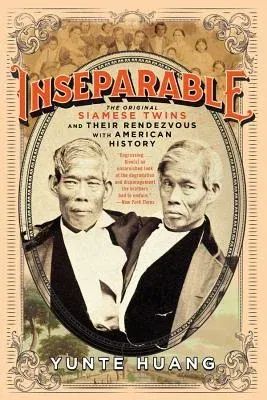Yunte Huang
(Author)Inseparable: The Original Siamese Twins and Their Rendezvous with American HistoryHardcover, 3 April 2018

Qty
1
Turbo
Ships in 2 - 3 days
In Stock
Free Delivery
Cash on Delivery
15 Days
Free Returns
Secure Checkout

Print Length
416 pages
Language
English
Publisher
Liveright Publishing Corporation
Date Published
3 Apr 2018
ISBN-10
0871404478
ISBN-13
9780871404473
Description
Product Details
Author:
Book Format:
Hardcover
Country of Origin:
US
Date Published:
3 April 2018
Dimensions:
23.62 x
15.49 x
3.81 cm
ISBN-10:
0871404478
ISBN-13:
9780871404473
Language:
English
Pages:
416
Publisher:
Weight:
725.75 gm